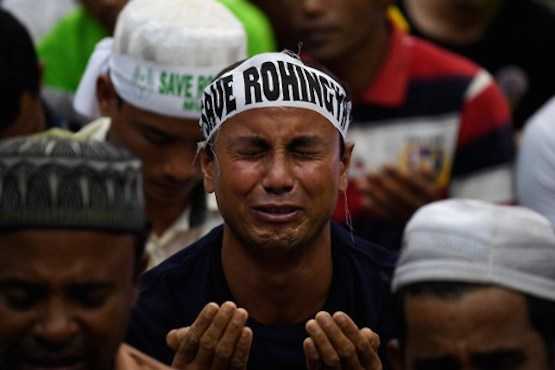
An ethnic Rohingya Muslim refugee breaks down during a gathering in Kuala Lumpur on Dec. 4, against the persecution of Rohingya Muslims in Myanmar. (Photo by AFP)
The Council of Churches of Malaysia (CCM) has urged the government to recognize and address the plight of tens of thousands of Rohingya refugees in Malaysia.
The council, speaking in concert with leaders of other religious bodies and civil groups, said the churches deplored the lack of concrete measures to grant formal status to the refugee population in the country despite regularly expressing sympathy for them.
Reverend Herman Shastri, CCM secretary-general, said the government has to face the responsibility of taking care for these vulnerable people and not leave them languishing in detention centers or to eke out a living on the margins of society.
Speaking at the launch of the "2017 Year of Solidarity with Rohingya" forum in Kuala Lumpur Jan. 8 whose speakers included Malaysia's Buddhist chief high priest Venerable Sri Dhammaratana, Rev. Shastri said it was disheartening to note that the government has done little to ease the hardship refugees in the country faced.
"The government must make every effort to rectify [withholding acceptance of international human rights standards] and be a signatory of the international convention of refugee rights because if not, they are talking about solidarity but not showing commitment," he said.
"This solidarity gathering may perhaps be another indication to our government that the time is now for them to put actions where their words are."
"This is a human rights issue," Rev. Shastri said, adding that the churches in Malaysia wished to show solidarity and commitment to resolving the Rohingya crisis.
"All human beings are created by God and therefore life is sacred and life is precious and all religions must do everything within their means to protect the life and dignity of all persons," Rev. Shastri said.
He said that as far as the churches in Malaysia were concerned, the plight of the Rohingya was a motivating force in their work for the marginalized who are discriminated against and their lives threatened.
"Right from the Vatican, the pope has called for the protection, for solidarity and international humanitarian assistance for such communities.
"The World Council of Churches has constantly made statements to influence policies of government and work with other religious bodies in order to find peaceful solutions and provide humanitarian aid," he told participants who included about 100 members of the Rohingya community living in the city.
The Malaysian government does not officially recognize refugees, thus making any formal, systematic efforts to address the crisis difficult.
According to Raudah Mohd Yunus, a researcher and activist with ASEAN Young Leaders Forum Malaysia, the condition of Rohingya in Malaysia is "extremely deplorable."
Many live in extreme poverty as they have no rights and work is illegal. Other basic services such as affordable education and health care are also denied.
Exploitation and harassment of refugees occurs at almost every level due to a lack of protection of this group under the country’s laws. For instance, it is not uncommon to hear stories of refugees being charged higher than normal taxi fares and many employers pay them less than locals because they are illegal workers.
Still, last month Prime Minister Najib Razak, gave hope for the better treatment of Rohingya refugees in the country when he led a protest rally against what he called a genocide of Myanmar’s Muslim Rohingya minority.
Najib urged his Asian neighbors and the world to step up pressure to stop the violence in Rakine State.
The high-profile rally at a stadium in Kuala Lumpur was meant to send a strong message to Aung San Suu Kyi’s government that "enough is enough," he said.
"UN, please do something. The world cannot sit by and watch this genocide taking place. The world cannot say it is not our problem. It is our problem," he said.


